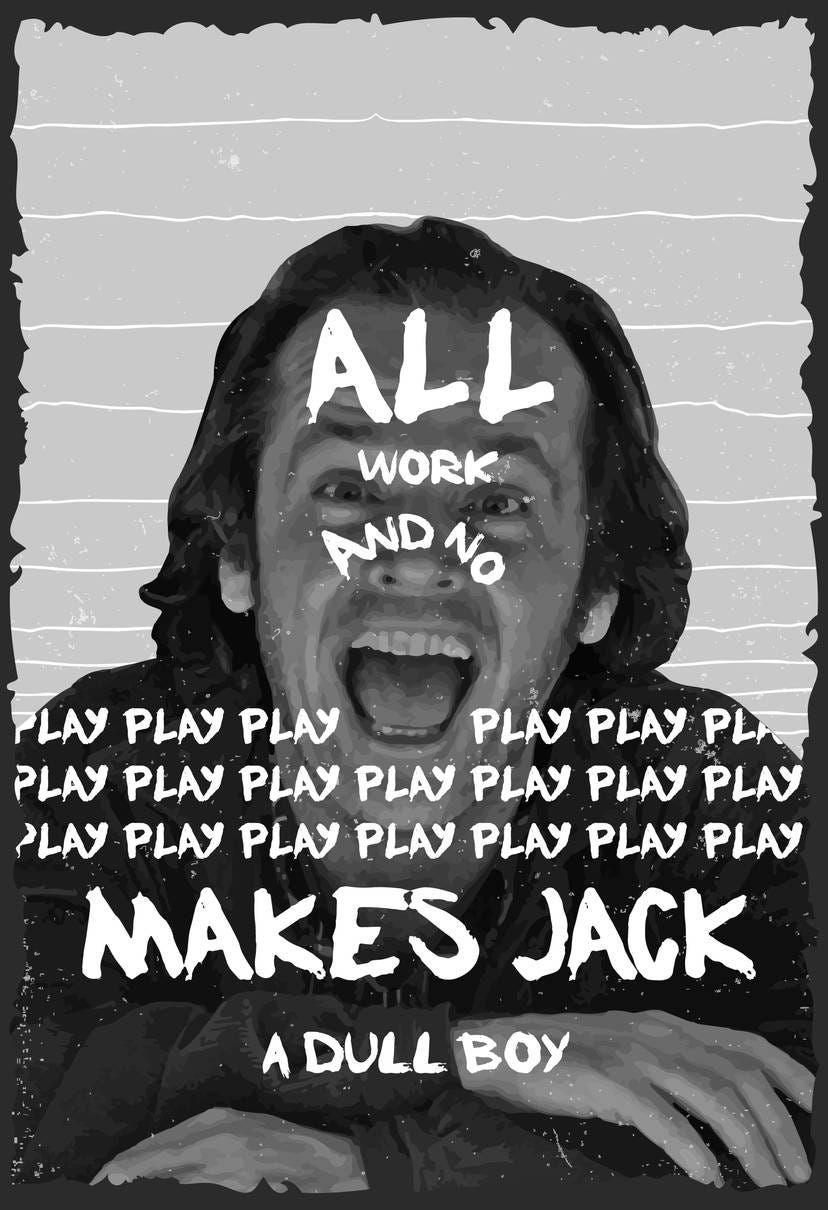Issue.23 - A Brazilian Model?
The lightweight philosophy of the ludic worldview.
23. Introduction
Salutations!!
And welcome, welcome.
My birthday was exactly 2 days ago.
But you are the one who gets a gift today, reader!
I prepared this Agency issue for you with much care.
(Believe me, It was pretty challenging to decode the worn-out letters of a very old paper)
So…
I shall start this issue with a question: Do you dream, reader?
Not as in daydreaming, when we start planning for our future or figuring out what we want to do with our lives.
But precisely like when our pet is taking a nap right beside us and starts barking while dreaming, making its bark sound like a narcoleptic hiccup in real life.
The simple idea of living a playful fantasy in the mind while our body rests and restores its biological resources and systems for another day to be seized.
As you might know, the Brazillian Carnival is the most famous and vibrant festival in the world. It is a massive and playful celebration that takes place annually in Brazil, usually in February. (It is happening in the Brazillian streets while I write this article.)

There’s a funny saying in Brazil which goes: “The year only truly starts after the Carnival”
Does that mean that the industries, commerce, and corporations only start working in Brazil after February? Of course not, but we like to play around with the idea that we are only ready to work hard after some playful time.
But here’s the thing that most people don't know. You might look up “Brazillian Carnival” on Google or even see some footage on TV of this beautifully aesthetic parade with astonishing costumes and decorated vehicles used as a moving platform for the parades. In major cities, the parades celebrate many different aspects of cultures worldwide.
However, a Brazilian Carnival in smaller cities, like my hometown Foz do Iguaçu, is slightly different. You can see people in costumes of many different characters, Spider-Man hanging out with Barbie, Wednesday Addams dancing with Iron Man, and even someone dressed as a bride of the year while enjoying a good samba.
This scenario feels ludic, welcoming and inspiring because many different cultural symbols and references are put together in a nutritious mix where everyone signs up for the same reason: to have fun.
Much this has to say about how the Brazillian sees the world: like a game to be played and enjoyed. It’s about breaking a smile and offering a hug, even in the hardest circumstances. The planet might not be in its best condition right now, but for the Brazillian, that doesn’t mean we must constantly be serious about it. In fact, taking some time off to have fun and celebrate life is sometimes the best medicine to recharge our batteries and motivations.
Perhaps this is where the expression “Jeitinho Brasileiro” comes from, meaning “The Little Brazillian way”. It is an expression that describes a cultural characteristic of Brazil, which involves finding creative or improvised solutions to deal with difficult situations, solving problems, or navigating obstacles. This term is often associated with unconventional ways of addressing everyday issues.
Let’s dive deeper into this.
23.1 - The Homo Ludens
And some cool insights.
We all know some of our 21 human species... homo neanderthalensis; homo erectus; homo habilis; and finally, homo sapiens; but attention, these are the ones that came before us. What comes next? Here is a question that cries out for an answer, and I might have one. I discovered two rare, very rare species!
I discovered the Homo Universalis while studying polymaths like Leonardo Da Vinci, Saint Thomas Aquinas, Ada Lovelace and Ruy Barbosa de Oliveira. They are those who understood that through the fire of discipline and the passion for curiosity, they could develop any necessary skills for them to create what was born in the space of their minds. These are people with a true dedication towards life and the collective intelligence of fraternity; they are part of a family that never ceases to exist because this is a family of genuine thirst for knowledge, hunger for wisdom, urge to build and need to serve.
Homo Ludens, I saw for the first time in a game by Hideo Kojima. I saw it for the second time in some research papers written by the Czech-Brazilian Professor Vilém Flusser, where he relates the “Homo Ludens” term to the “Brazilian way” I mentioned above. I saw it for the third time in a book written in 1938 by Johan Huizinga, where the term was first coined: "Homo Ludens: A Study of the Play-Element in Culture". In this influential work, Huizinga explores the significance of play in human culture and society. The main thesis of "Homo Ludens" is that play is a fundamental aspect of human culture, and it permeates various aspects of human life, including art, language, law, and rituals. Huizinga argues that play is not just a trivial or frivolous activity but rather a crucial element that shapes human civilization. According to Hideo Kojima, the Homo Ludens are those who play to unite people, to create culture and to shape the world around them.
How awesome is that?
In the past, I have discussed here in Agency how important it is to keep our inner child healthy and safe so that we can be well-connected with our creative capacities - Check out the article below.
If we are to consider the species of Homo Ludens for a second, it regards being a human that is playful and that doesn’t take life seriously because, at the end of the day, we are all here to enjoy it. But maintaining this attitude in adulthood is perhaps the biggest challenge for every single one of us.
Be honest, reader; what do you think about video games? Most would say that they are something made for kids and teenagers. But acknowledging gaming as a form of entertainment and enjoying some gaming while being an adult is, more than anything, breaking a stigma.
I wouldn’t know anything about this stigma, considering my father is in his 60s and enjoys playing FIFA on his Xbox with his online friends every single day after work.
Being able to have some fun in our own homes by interactively exploring fictitious worlds or sports is, in fact, a very important form of leisure and inspiration in a present where we have to work and produce so much.
In fact, Stanley Kubrick said it first in the script of the classic movie “The Shining”
All work and no play makes jack a dull boy.
- Jack Torrance writes in a typewriter.
Listen.
Most of the time, a stigma is a mere lack of reference.
And talking about references, let’s jump to the next topic.
21.2 - A Brazillian Model
A new type of man?
This essay from Vilém Flusser navigates around the geographic aspects and origins of the Brazillian nation. He points out that although Brazil shares its origin in the Iberian civilization, which correlates with the Portuguese and Spanish cultures, there are two divisions in Brazil (Southern and North-Easten) that are very different in economic, cultural, social and racial aspects.
I have introduced Vilém Flusser in a previous edition of the newsletter; you may find it below.
According to him in this paper, in a nutshell:
“Southern Brazil is an industrialized sub-proletarian society composed of whites, negros and Japanese. While noth-eastern Brazil is a feudal or even more primitive society composed of White-Indian mixtures dominated by white classes.”
He advances his reasoning by comparing Brazilian Nationalism to a copy of nineteenth-century European Nationalism while mentioning the constant migration process that happens from the North-East to the South, which happens as a form of economic colonization done by the South. He also points out that this dynamic may nonetheless become a potent factor in a possible new society crystallizing out of this heterogeneous situation - which is actually the paper's subject.
Flusser dives deeper into some cultural aspects and reasons behind these two divisions, how they see each other and what they look for in each other, and he also discusses carnival and soccer.
“The carnival is a mythical scene in which men participate with religious dedication, but always with the consciousness that it is a playful representation. Football is a mythical ritual in which all male participants in Brazillian masses take part actively, and which constitutes a world governed by mythical models totally unlike the occidental TV myths, but which is still a world of dialectical conflict without ever losing its playful aspect.”
He also brings up the expression “The Little Brazillian Way”, labelling it as “Malandro”, which translates as “Hustler“, and he describes that as a synthesis of a) the African god Exu (the worker, defender, and known as the messenger and guardian of the terreiros, villages, cities, homes, axé, and human behaviour) and b) some aspects of the occidental concept of the devil.
According to him, amidst all the challenges and difficulties that the Brazillian man faces as a byproduct of his own origins:
“This combination of archetypes gives the Brazillian life an atmosphere of lightness, of standing above the world and looking at it as a game, which prevents the animal seriousness so characteristic of the western scene, and the non-transcendence so characteristic of African cultures.”
He continues his research by providing examples of how this particular and unique playful personality of the Brazillian can positively affect many different fields of human culture, some of them are a) the type of music produced in Brazil, b) new sorts of painting, c) a new type of writing, d) a very large scale landscape planning innovative framework, e) a new attitude of many in the field of scientific research.
Many pages in this manuscript scan are worn out, and it is quite puzzling to understand it in its full extension, but he finalizes his theories by mentioning the first mentioned above term, “Homo Ludens”
“Because Brazil is one of the very few places left where the concept of a post-historical man in the sense of “homo ludens” is not an abstract idea elaborated by isolated thinkers. It is a place where this concept is actually being lived. […] It is a sort of sacrificial, although ironical, commitment. It may become, because it is spontaneous and also deliberate, a model for other societies as well.”
I’m afraid this is a wrap for this newsletter edition. However, I will keep researching his papers and decoding the missing letters to bring fresh ideas to our readers.
See you next time, reader.
Just don’t forget.
All work and no play makes Jack a dull boy!
About the Author
Thiago Patriota
Made in 1996. Born & Raised Brazillian. Bachelor’s Degree in Advertising and Communication. Adept to autodidactism. Curious Soul. Founder of Agency.
That’s me in a nutshell, but you can learn more about Agency and myself on the About page!









